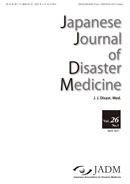【Background】 No detailed data regarding the duties performed by administrative staff at disaster-based hospitals during a disaster was found. 【Purpose】 The purpose of this study was to identify the duties performed by administrative staff at disaster-based hospitals during the Great East Japan Earthquake. 【Method】 A cross-sectional study using questionnaires and interviews was conducted. 【Target】 The target population was administrative staff at disaster-based hospitals in Iwate, Miyagi, and Fukushima prefectures. 【Result】 The study found that administrative staff were involved in 65 disaster operations that they would not normally perform. Normal operations were reduced to approximately 30% of their total capacity and were restored gradually. 【Consideration】 These 65 tasks included those that could be handled with external resources, those that required planning, and those that required training. Additionally, the study identified some normal operations that cannot be interrupted, such as management and labor management, highlighting the importance of planning. 【Conclusion】 To prepare for future disasters, it is necessary to develop educational programs and provide opportunities for administrative staff to learn how to perform their normal duties during disasters and to handle new tasks that may arise. In addition to using the results of this survey as the basic data for a realistic and effective revision of the BCP, the study emphasizes the need for disaster-based hospitals to have trained administrative staff who can perform a wide range of tasks during a disaster.
View full abstract
